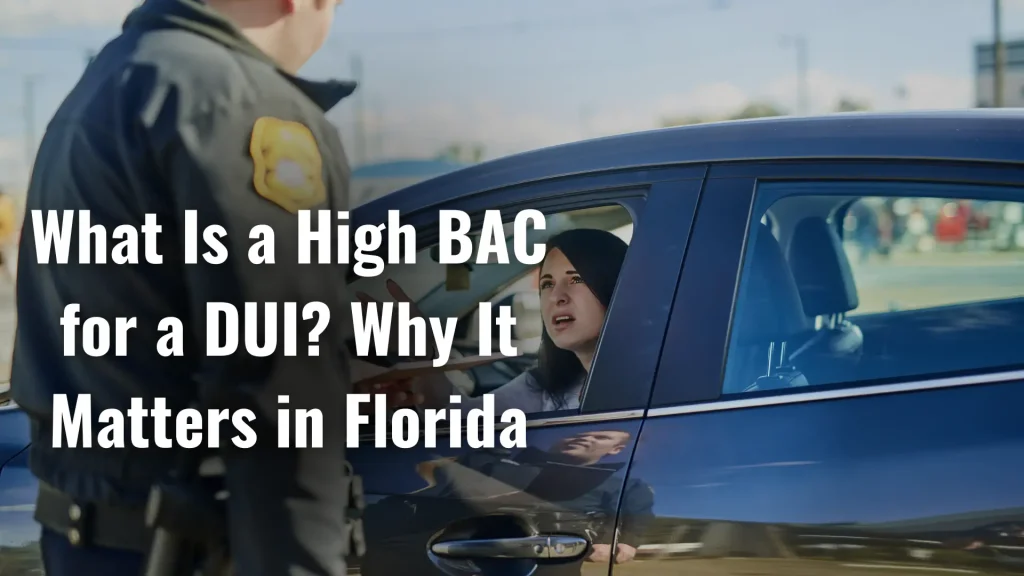Posted on Sunday, September 1st, 2024 at 9:00 am

Driving under the influence (DUI) is a severe offense in Florida, and the state enforces strict laws to deter impaired driving. The main critical factor is the driver’s blood alcohol concentration (BAC). Higher BAC levels indicate more significant impairment, leading to harsher consequences, even for a first-time DUI. Recognizing the potential implications of a high BAC DUI in Florida is critical to protecting your future. But what is a high BAC for a DUI, and how could it affect the outcome of your case?
What Is a High BAC?
A high BAC significantly impacts DUI charges and penalties. The Florida BAC limit for drivers is 0.08 percent. This means that if your BAC is 0.08 percent or higher, you can face DUI charges. Generally, a 0.15 percent or higher BAC can result in more severe penalties.
Additionally, a high BAC combined with other aggravating factors can result in further penalties. A DUI with a minor present or an accident resulting in injury or property damage can increase possible penalties.
Why BAC Levels Matter
BAC levels influence the severity of DUI charges and penalties. Florida law views higher BAC levels as indicative of an increased risk to public safety. Because of this, a high BAC can result in increased fines, longer license suspensions, and the mandatory installation of an ignition interlock device (IID) in your vehicle.
What Are the Penalties for a High BAC DUI?
A Florida DUI with a BAC of 0.15 percent or higher results in enhanced penalties beyond temporary vehicle impoundment and mandatory DUI or driving school attendance. These penalties are more severe than those for a standard DUI and can significantly impact your life. These penalties can include:
- First Offenses – Penalties for a first DUI with a BAC of 0.15 percent or higher include fines from $1,000 to $2,000. You may face up to nine months of jail time and a license suspension from 180 days to a year. Probation lasts one year, and you must purchase and install an IID for six months after getting a hardship license.
- Second Offenses – Fines range from $2,000 to $4,000 for a second DUI offense. You can face up to a year of incarceration. License suspension lasts at least five years. After getting a hardship license, you must pay for and install an IID for two years.
- Third Offenses – Penalties for a third and felony DUI in Florida include a minimum fine of $4,000 and up to a year in jail. License suspension lasts 10 years, and you must install an IID for two years after receiving a hardship license.
- Fourth and Subsequent Offenses – For a fourth or subsequent DUI offense with a BAC of 0.15 percent or higher, fines start at $2,000. You can face up to five years in prison and lose your license permanently, only becoming eligible for a hardship license after five years. After getting a hardship license, you must keep an IID in your car for at least two years.
Defending Against a High BAC DUI

Facing a DUI charge can be daunting, but there are several potential challenges and defenses against these charges. The following defenses may help reduce penalties or possibly result in a dismissal of the charges:
- Illegal Traffic Stop – Law enforcement officers must have probable cause or reasonable suspicion to initiate a traffic stop. If the officer lacks a valid reason to stop you, any evidence gathered during the stop might be inadmissible in court.
- Inaccurate Field Sobriety Tests – Law enforcement officers use field sobriety tests (FSTs) to assess a driver’s impairment. Commonly used tests include walking in a straight line, standing on one leg, and following an object with your eyes. These tests are subjective, and factors such as fatigue or medical conditions can influence the results. Challenging the accuracy and administration of FSTs can weaken the state’s case.
- Faulty Breathalyzer Test – Breathalyzer devices measure BAC but are not always accurate. Factors such as device calibration, proper administration, and the presence of substances like mouthwash or certain medications can affect breath test results. Questioning the device’s reliability and the officer’s training can weaken the state’s case.
- Improper Police Conduct – Police officers must follow specific procedures during a DUI stop and arrest for DUI. If the officer violated your rights, such as failing to read your Miranda rights or using excessive force, this could result in the exclusion of evidence or dismissal of charges.
Contact a Florida DUI Defense Attorney Today
If you’ve been charged with DUI, you need a strong defense. The experienced Pensacola DUI defense attorneys at The Morris Firm understand the difficulties of DUI laws and will fight to protect your rights. We provide personalized and aggressive representation to help fight for the best possible outcome for you. Call our office at (850) 503-2626 for a consultation. Reach out today to secure the defense you deserve.
Related Posts:
Can a Florida DUI Lead to Deportation?
How to Avoid DUI During the Holidays
